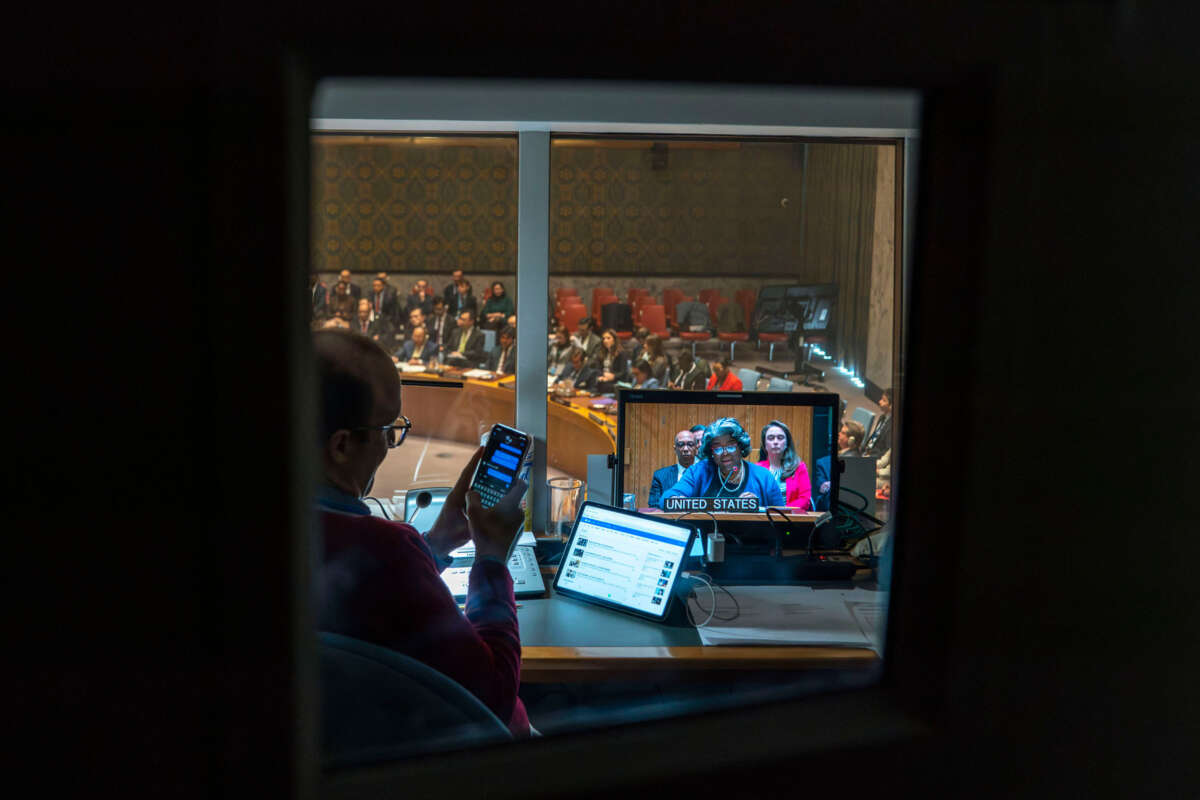A U.S.-led resolution promoting a nominal ceasefire action in Gaza was defeated by a United Nations Security Council vote on Friday morning, with those opposed to the resolution noting that the measure didn’t go far enough.
Although most member nations supported the proposal, three of the countries on the Security Council opposed it. Votes from Russia and China, which have veto powers on the council, led to its automatic defeat. Algeria also voted against the resolution, and Guyana abstained from voting.
Russia condemned the resolution for being both too little and too late, with that nation’s ambassador, Vassily Nebenzia, describing the measure as “not enough” and noting that it failed to demand an actual, lasting ceasefire. Nebenzia further described the vote as a ploy to “throw [U.S. voters in support of a ceasefire] a bone” with a false ceasefire call.
Guyana Ambassador Carolyn Rodrigues-Birkett also explained why her nation could not in good conscience support the measure.
“Guyana could not support a resolution that does not unequivocally call for an immediate ceasefire,” Rodrigues-Birkett said in a speech to the council.
Indeed, Rodrigues-Birkett pointed out that the resolution put more emphasis on Hamas’s actions than Israel’s, with the latter only being mentioned once in the entire resolution.
“If one were to read this resolution without background knowledge, it would be difficult to ascertain which party in this conflict is committing the atrocities in Gaza which necessitated this draft resolution being put forward,” she added.
Hamas’s October 7 attack on Israel killed around 1,200 Israelis and ended with more than 200 taken hostage. In response, Israel launched a genocidal bombing and starvation campaign against Gaza, killing more than 32,000 Palestinians, over 4 in 10 of whom were children. Tens of thousands more have been injured or are currently missing — presumed to be dead under the rubble — and millions of Palestinians have been displaced.
“Two wrongs cannot make a right,” Rodrigues-Birkett added in her statement, “and the Palestinian people should not be collectively punished and themselves held hostage for the crimes of others.”
Analysis of the resolution shows that the critics’ concerns are legitimate. According to Al Jazeera’s diplomatic editor James Bays’s examination of the text, the resolution states that the U.N. Security Council “determines the imperative of an immediate and sustained ceasefire to protect civilians on all sides, allow for the delivery of essential humanitarian assistance, and alleviate humanitarian suffering.”
The use of the word “imperative” makes it seem that “it is important that there is a ceasefire” rather than “demanding one now,” Bays noted, adding:
It’s certainly the strongest language yet [from the U.S. at the U.N.], but is it what the rest of the Security Council wants in terms of a demand for an immediate ceasefire? Or is it just a resolution where the Security Council would say an immediate ceasefire is something that’s very important?
Notably, the U.S. has vetoed three UN resolutions calling for an immediate ceasefire in Gaza since Israel launched its genocidal siege in October.
We’re not backing down in the face of Trump’s threats.
As Donald Trump is inaugurated a second time, independent media organizations are faced with urgent mandates: Tell the truth more loudly than ever before. Do that work even as our standard modes of distribution (such as social media platforms) are being manipulated and curtailed by forces of fascist repression and ruthless capitalism. Do that work even as journalism and journalists face targeted attacks, including from the government itself. And do that work in community, never forgetting that we’re not shouting into a faceless void – we’re reaching out to real people amid a life-threatening political climate.
Our task is formidable, and it requires us to ground ourselves in our principles, remind ourselves of our utility, dig in and commit.
As a dizzying number of corporate news organizations – either through need or greed – rush to implement new ways to further monetize their content, and others acquiesce to Trump’s wishes, now is a time for movement media-makers to double down on community-first models.
At Truthout, we are reaffirming our commitments on this front: We won’t run ads or have a paywall because we believe that everyone should have access to information, and that access should exist without barriers and free of distractions from craven corporate interests. We recognize the implications for democracy when information-seekers click a link only to find the article trapped behind a paywall or buried on a page with dozens of invasive ads. The laws of capitalism dictate an unending increase in monetization, and much of the media simply follows those laws. Truthout and many of our peers are dedicating ourselves to following other paths – a commitment which feels vital in a moment when corporations are evermore overtly embedded in government.
Over 80 percent of Truthout‘s funding comes from small individual donations from our community of readers, and the remaining 20 percent comes from a handful of social justice-oriented foundations. Over a third of our total budget is supported by recurring monthly donors, many of whom give because they want to help us keep Truthout barrier-free for everyone.
You can help by giving today. Whether you can make a small monthly donation or a larger gift, Truthout only works with your support.
